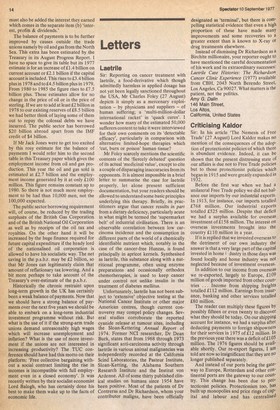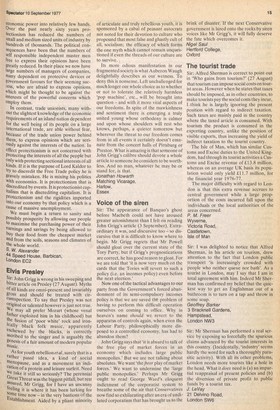Criticising Kaidor
Sir: In his article 'The Nemesis of Free Trade' (27 August) Lord Kaldor makes no mention of the consequences of the adoption of protectionist policies of which there is abundant evidence. Indeed, it can be shown that the present distressing state of our affairs is due not to Free Trade policies but to those protectionist policies which began in 1915 and were greatly expanded in 1932.
Before the first war when we had a unilateral Free Trade policy we did not balance our imports by our industrial exports. In 1913, for instance, our imports totalled £768 million. Our industrial exports totalled £525 million. Despite that deficit we had a surplus available for overseas investment of £158 million. The interest on overseas investments brought into the country £110 million in a year.
If it is replied that we invested overseas to the detriment of our own industry the answer is that a very large part of the capital invested in home i dustry in those days was found locally and home industry was not neglected because of investment overseas.
In addition to our income from overseas we re-exported, largely to Europe, £109 million of goods imported from other countries . . Income from shipping freights totalled £112 million. Earnings from insurance, banking and other services totalled £80 million.
The reader can multiply these figures by possibly fifteen or even twenty to discover what they should be today. On our shipping account for instance, we had a surplus after deducting payments to foreign shipowners for their services in 1975 of £12 million. In the previous year there was a deficit of £105 million. The 1976 figures should be avail. able shortly. Our re-export figures, I am told are now so insignificant that they arello longer published separately.
And instead of our ports being the gate" way to Europe, Rotterdam and other continental ports are the gateway to our coun. try. This change has been due to protectionist policies. Protectionism too, has built up monopolies and price rings of capital and labour and has centralised economic power into relatively few hands. Over the past nearly sixty years protectionism has reduced the numbers of ;mall and medium sized units of industry by hundreds of thousands. The political coniequences have been that the numbers of S'elf responsible independent master men free to express their opinions have been greatly reduced. In their place we now have large numbers of managers of companies, many dependent on protective devices or government favours for their seeming sue-. Dess, who are afraid to express opinions,. .which .might be thought to be against the interests of the powerful concerns which employ them.
In contrast, trade unionists, many without the slightest knowledge of the economic requirements of an island nation dependent for the well being of its people on a large international trade, are able without fear, because of the trade union power behind them, to express opinions which are seriously against the interests of the nation. In effect protectionism is not concerned with Protecting the interests of all the people but only with protecting sectional interests of all kinds. If it is the purpose of Lord Kaldor to try to discredit the Free Trade policy he is gravely mistaken. He is mixing his politics With economics. It is protectionism that is discredited by events. It is protectionist capitalism that is discrediting capitalism. It is Protectionism and the rigidities imported into our economy by that policy which is a cause of massive unemployment. We must begin a return to sanity and Possibly prosperity by allowing our people to maximise the purchasing power of their earnings and savings by being allowed to buy their food from the cheapest market and from the soils, seasons and climates of the whole world.
S. W. Alexander 44 Speed House, Barbican, London EC2































 Previous page
Previous page